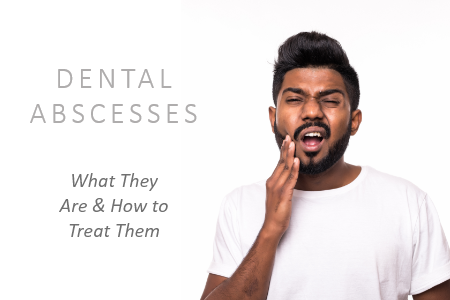Dental Abscesses: What They Are and How to Treat Them
 Even if you’ve never experienced a dental abscess, you’ve likely heard the term and are probably aware it’s not something pleasant. That said, what exactly is a dental abscess?
Even if you’ve never experienced a dental abscess, you’ve likely heard the term and are probably aware it’s not something pleasant. That said, what exactly is a dental abscess?
What is a Dental Abscess?
A dental abscess is a pocket of pus that forms in your mouth tissues because of a bacterial infection. If you notice swelling and inflammation when you have an abscess, it could affect your teeth and the jaw tissue next to and around the teeth.
Your teeth are made up of these layers:
The Enamel – The outer layer
Dentin – A softer layer covered by the enamel.
Pulp – The layer underneath the dentin, where your tooth’s nerves and blood vessels are. The pulp runs down the center of the root of your tooth, which connects the tooth to the underlying bone of the upper or lower jaw.
It’s very easy for infections in the pulp to spread to the bone of your jaw. Similarly, if the gum around your tooth gets infected, it’s in danger of becoming damaged. Some abscesses begin in the pulp, and others start in the tissues around the pulp.
The Two Major Subtypes of Dental Abscesses
Periapical abscesses affect the inside of the tooth and normally occur near the tip of the root. This dental abscess occurs more often in children than adults. Children that have poor dental hygiene are at an even greater risk for these kinds of abscesses.
Periodontal Abscesses affect the gums and occur more often in adults than in children. This kind of abscess normally stems from complications of gum disease. Gum disease can cause your teeth to become loose or inflamed, which can cause a pocket to form in between the tissue and your tooth. This pocket is susceptible to infection, and can cause a periodontal abscess.
Signs and Symptoms of a Dental Abscess
Dental abscesses can be painful. You may feel pain in your tooth itself, the gums around your tooth or the pain may even affect areas such as your jaw, cheeks, neck or face. It depends on where your abscess is located. Other symptoms of a dental abscess include:
- Tenderness
- Tooth may feel loose in the jaw
- Sensitivity to heat and/or cold in the mouth
- Sensitivity to pressure on the tooth
- Swelling in the gums/face
- Redness of skin over the affected area
- Bleeding in the gums
- Swollen lymph glands in the neck
- Loss of appetite or inability to eat
- Fever
What Causes Dental Abscesses?
Bacterial infections cause dental abscesses when the gum tissue around your tooth or the tooth itself is damaged. Poor dental hygiene such as not brushing or flossing regularly, high sugar intake or irregular dental visits are some of the main reasons your teeth and gums can become damaged, which can cause a dental abscess. Keeping your teeth and gums healthy is the best way to ensure you don’t experience one of these painful dental abscesses.
Treatment of Dental Abscesses
Make sure to seek professional treatment if you suspect a dental abscess. There are several options your dentist may recommend for treatment.
- Drain pus/Clean affected area
- Root Canal Treatment
- Pain Management and antibiotics such as Penicillin, Amoxicillin, Azithromycin, Metronidazole, and Cefoxitin
If you are concerned that you may have a dental abscess, please call our office right away to make an appointment. We are currently seeing new and existing patients and would love to help treat your dental abscess. It’s always a good idea to make an appointment, even if you aren’t 100% sure what you are experiencing is a dental abscess. Our staff can get to the bottom of whatever is going on and we can also answer any questions or concerns you may have regarding this issue or any other dental issues. Don’t hesitate to call our office, today!
The content of this blog is not intended to be a substitute for professional medical advice, diagnosis, or treatment. Always seek the advice of qualified health providers with questions you may have regarding medical conditions.
